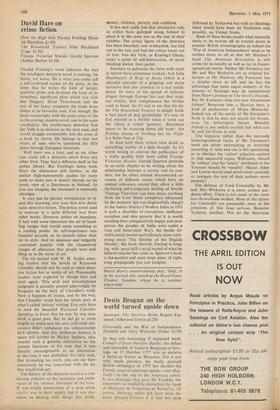David Hare on crime fiction
The Household Traitors John Blackburn (Cape £1.50) Vintage- Victorian Murder Gerald Sparrow (Arthur Barker £1.50) Vintage- Victorian Murder Gerald Sparrow (Arthur Barker £1.50) Nicolas Freeling's work indicates the way the intelligent detective novel is moving, for better, for worse. He is what you could call a self-confessed master of the genre, in the sense that he writes the kind of jumpy, assertive prose and develops the kind of in- termittent, significant plots which win Gol- den Daggers, Silver Truncheons and the rest of the fancy weaponry the trade bran- dishes at its favourite sons. Fair enough. He deals increasingly with the same areas of life as the average modern novel, and in the same vocabulary. His world-weary detective Van der, Valk is as deracing as the next man, and would snuggle comfortably into the arms of a book by Sartre. He belongs to that lost strain of men who've sauntered for fifty years through European literature.
Well there was a time, and so on, when you could tell a detective novel from any other kind. They had a different shelf at the public library. But Freeling's latest book blurs the distinction still further, as the author high-humouredly pushes his story aside to make sure it doesn't intrude on his ironic view of a Dutchman in Ireland. As you can imagine, the treatment is resolutely unvulgar.
It may just be phoney romanticism to re- sent this knowing, arty tone that now domi- nates detective fiction. The police novel used to resonate in a quite different way from other books. However artless or mundane, it had with some innocence the air of hand- ling images that would mean something to a reading public. Its self-importance was founded securely on its content rather than on its style. And its openness and vulgarity contrasted happily with the clapped-out images of alienation that people were ped- dling us in the name of art.
The rot started with W. H. Auden assur- ing readers that the novels of Raymond Chandler should not be read as mere detec- tive fiction but as works of art. Presumably readers were expected to change hats and start again. This arch and presumptuous judgment is actually quoted approvingly by Penguins on the back of Chandler's work. Now it happens of course, and by the way, that Chandler could beat the whole pack at what's called 'serious' writing. You only have to read the beautiful Raymond Chandler Speaking to know that he was, by any stan- dard, a great poet. But he did go to some lengths to make sure his own cultivated seri- ousness didn't unbalance the subject-matter he'd chosen. And this deliberate flatness is taken still further by Mickey Spillane, who created such a genuine alternative to the current literature of his time that it was literally unrecognisable as an alternative at the time it was published. It's only now, that re-reading his work, you can see how consciously he was concerned with the art that would hide art.
The history of the detective novel is a con- tinuing criticism of the insularity and irrele- vance of the 'serious' literature of the time. It was vitally entertaining at a time when vitality was in short supply. but it was also closer to dealing with things like work, money, violence, poverty and ambition.
It has now sadly lost that alternative role, as critics have galloped along behind to place it in the same zoo as the rest of their exhibits. The actual figure of the detective has been bleached, and re-bleached, has laid out in the sun, and had the colour burnt out of him. Van der Valk, or Keating's Ghote, make a point of self-deprecation, of never blushing darker than pastel.
Attempts to galvanise the form with myth or horror have sometimes worked. And John
Blackburn's A Ring of Roses (-1965) is a splendid example of a gripping and sharp narrative that also connects to a real intelli- gence. Its story of the spread of bubonic plague through Europe has just that origi- nal vitality, that completeness the thriller used to boast. So it's sad to see that his lat- est The Household Traitors is simply lurid, a bad piece of pop psychology. It's easy to feel cheated in a thriller when it turns out the villain is called 'genetics'. Blackburn seems to be watering down old work : the Panther reissue of Nothing but the Night is a better buy at 25p.
At least both these writers treat death as something worthy of a little thought. So it's worth noting in contrast the publication of a really grubby little book called Vintage Victorian Murder. Gerald Sparrow pretends in an early chapter to be writing about the relationship between a society and its mur- ders, but he offers instead disconnected ac- counts of different events which have no mutual relevance, except they allow a little lip-licking sub-Lustgarten baiting of breath. 'Vintage Victorian' can here mean anything from the Cato Street conspiracy (dismissed by the sentence 'gin was disgracefully cheap') to the Indian Mutiny ('Modern India in 1971 is such a shambles of corruption, inefficient socialism and dire poverty that it is worth recalling how comparatively happy and pros- perous the peoples of India were under a wise and benevolent Raj'), Set beside Or- well's much shorter and infinitely more inter- esting essay 'The Decline of the English Murder', the book shrivels. Feeling is keep- ing with great skill a serial record of what he believes murder has come to. Sparrow's book is the "tastiest and most inept piece of right- wing propaganda you can imagine.
David Har•e's award-winning play, 'Slag', is to be revived this month at the Royal Court Theatre, London, where he is resident playwright


































 Previous page
Previous page